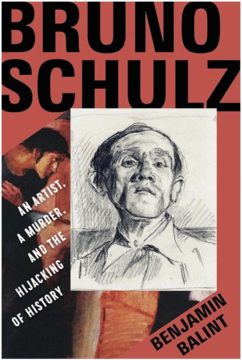Leo Lasdun in The Millions:
 In Humboldt’s Gift, Saul Bellow’s roman à clef about his turbulent friendship with the poet Delmore Schwartz, the Bellow stand-in muses that “all the highly gifted see themselves shunted for decades onto dull sidings, banished exiled nailed up in chicken coops. Imagination has even tried to surmount the problems by forcing boredom itself to yield interest.” He goes on to name Joyce, Stendhal, Flaubert, and Baudelaire as a few sultans of solitude. If he’d wanted to sell it even harder, he might have tacked on the Jewish-Polish writer and artist Bruno Schulz. Unearthed again in a new biography by Benjamin Balint, Schulz was hamstrung by boredom and loneliness. Twice denied a paid leave of absence (which he requested in order to focus on his writing) from his job as a school teacher, and later boxed into a Jewish ghetto, Schulz spent nearly his entire life in Drohobycz, where he was born in 1892. The small slippery city has changed management a number of times: for most of Schulz’s adulthood, Drohobycz was part of Poland, before that Austria-Hungary, now it’s part of Ukraine (spelled Drohobych). Except for some short trips, Schulz never left his hometown, and he became well acquainted with isolation. In his own words, “loneliness is the catalyst that makes reality ferment”; in Balint’s words, Schulz “made of his solitude a way of seeing.”
In Humboldt’s Gift, Saul Bellow’s roman à clef about his turbulent friendship with the poet Delmore Schwartz, the Bellow stand-in muses that “all the highly gifted see themselves shunted for decades onto dull sidings, banished exiled nailed up in chicken coops. Imagination has even tried to surmount the problems by forcing boredom itself to yield interest.” He goes on to name Joyce, Stendhal, Flaubert, and Baudelaire as a few sultans of solitude. If he’d wanted to sell it even harder, he might have tacked on the Jewish-Polish writer and artist Bruno Schulz. Unearthed again in a new biography by Benjamin Balint, Schulz was hamstrung by boredom and loneliness. Twice denied a paid leave of absence (which he requested in order to focus on his writing) from his job as a school teacher, and later boxed into a Jewish ghetto, Schulz spent nearly his entire life in Drohobycz, where he was born in 1892. The small slippery city has changed management a number of times: for most of Schulz’s adulthood, Drohobycz was part of Poland, before that Austria-Hungary, now it’s part of Ukraine (spelled Drohobych). Except for some short trips, Schulz never left his hometown, and he became well acquainted with isolation. In his own words, “loneliness is the catalyst that makes reality ferment”; in Balint’s words, Schulz “made of his solitude a way of seeing.”
More here.
